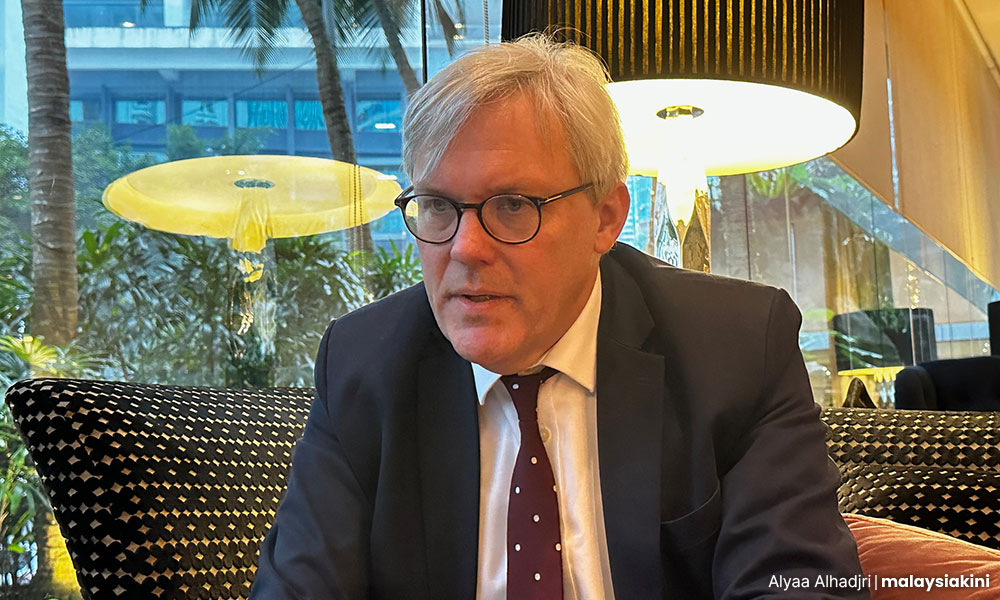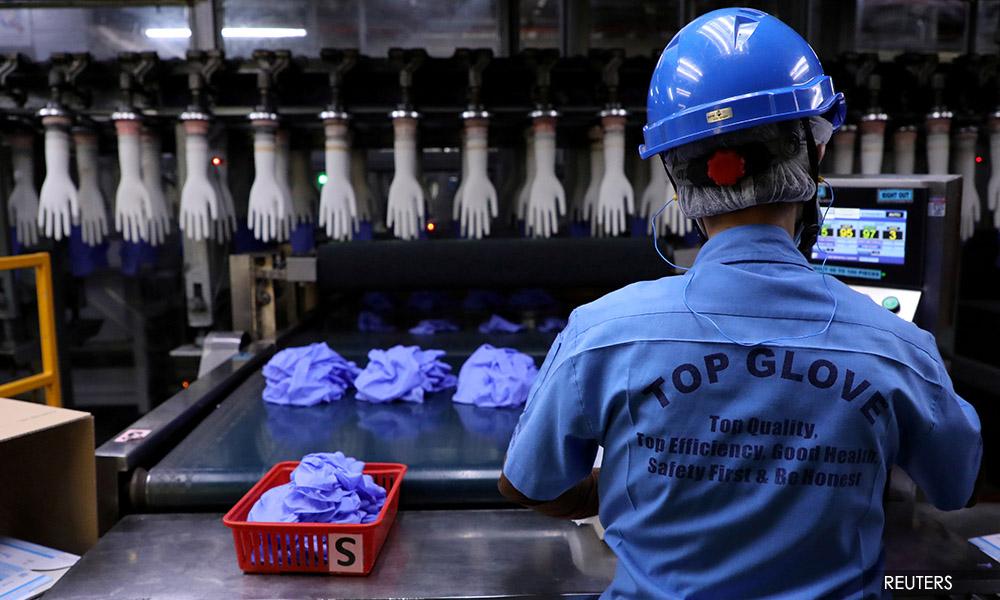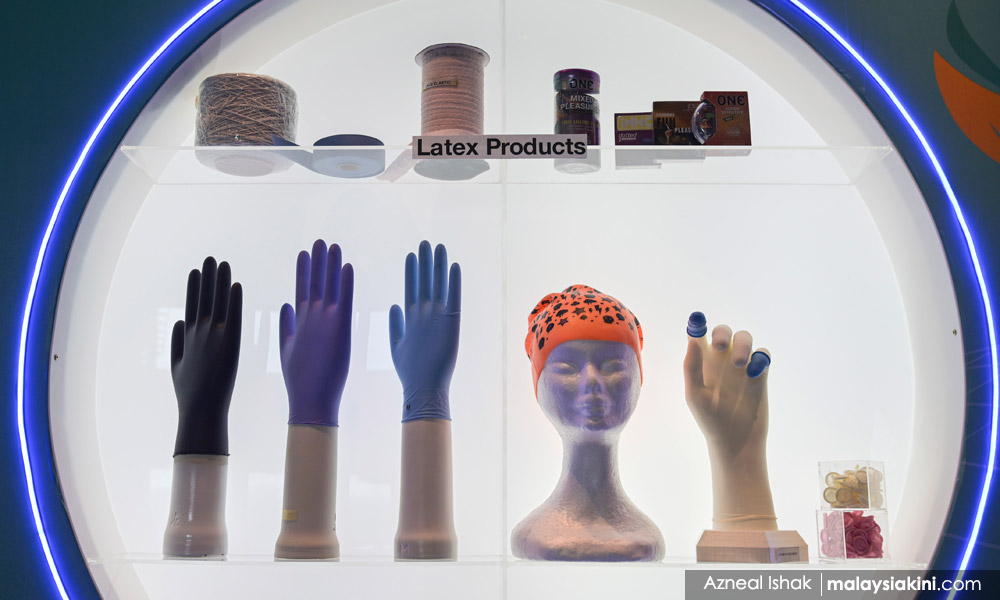Malaysia’s rubber glove manufacturers must now submit comprehensive audit reports clearing them of forced labour practices before they can sell to the UK’s National Health Service (NHS).
UK envoy for migration and modern slavery Andrew Patrick said this is in accordance with the UK’s newest and improved procurement framework.
“It’s a framework run by the Department of Health’s procurement experts who will be implementing it with firmness and I’ll be working with them.
“To actually get business, they need to meet the audit requirements.
“We have given our commitment to the British Parliament that we will do everything we can to eliminate forced labour from the supply of medical goods to the NHS,” he told Malaysiakini in an interview recently.
Patrick is in Malaysia on a special mission to engage with Putrajaya in addressing the risks of forced labour in the supply chains of goods to the UK.

He also met with the Malaysian Rubber Glove Manufacturers Association to ensure compliance with the new procurement framework.
“We talked to manufacturers about the new measures and we want to make sure we can work with the manufacturers who can ensure there is no forced labour in that supply chain.
“We discussed the new approach to procurement (buying gloves).
“We will be expecting manufacturers to be a lot more transparent with their operations and the UK government will also be able to conduct an audit on any company in the supply chain,” he said.
NHS major importer of M’sian rubber gloves
He noted that forced labour allegations around NHS' suppliers of personal protection equipment (PPE), including rubber gloves, have been a prominent issue in the British media and Parliament.
As such, his trip was primarily to engage with the relevant Malaysian government agencies to tackle forced labour in the country.
It is estimated that the UK government buys five percent of all Malaysian rubber glove exports, entirely for the NHS.
After the UK government’s purchase of disposable gloves from Malaysian glovemaker Supermax Corporation Bhd’s subsidiary in 2020, the US and Canada imposed a ban on imports of goods from the same firm.
This was based on allegations of forced labour practices of its migrant workforce dating back to 2019.

The following year, Supermax pledged to reimburse recruitment fees paid by its current and former migrant workers, along with other remedial measures in a bid to lift the Withhold Release Order (WRO) imposed by US Customs and Border Patrol (CBP).
Recruitment fees were often exorbitant fees which workers pay, usually to agents, to secure employment.
While it does not necessarily mean there is forced labour, it could lead to debt bondage - one of the International Labour Organisation's indicators of modern day slavery.
In 2022, the UK High Court allowed a judicial review of the UK government’s decision to proceed with its continued use of Supermax-produced disposable gloves despite forced labour allegations against it.
The UK's Kuala Lumpur mission political counsellor Tom Shepherd said at the end of the previous procurement framework, all the rubber glove suppliers, including Supermax, were audited.
The outcome of the audit is confidential but an action plan to rectify bad practices was put in place for companies that failed the audit.
Other rubber glove manufacturers who are addressing WRO requirements or had done so in the past were Top Glove, WRP, Smart Glove, Brightway Holdings, Hartalega Holdings and YTY Industry Holdings.
Top Glove and WRP supplied rubber gloves to the NHS in 2018.

Top Glove implemented a zero recruitment fee policy in 2019, while WRP has also reimbursed recruitment fees to workers following backlash.
UK not softer than US
Shepherd said while the UK does not have the equivalent of a US CBP, which can issue an order to stop suspect goods from entering the country, the government's procurement team does conduct its own due diligence.
"Our procurement team could decide not to buy from a manufacturer if they believed there was forced labour in the operations.
“It is not quite the same as the WRO but it amounts to banning goods,” he added.
Patrick said not having an equivalent authority as the US CBP does not make the UK softer on cases of imports of goods produced by forced labour.
“It would be a mistake to think that the UK was softer than the Americans because that was not the case. It’s just a different approach," he explained.
“We are not in the business of WRO, but we are taking our due diligence with regard to procurement very seriously.
“Ultimately, if you are unable to raise your standards over time, to the standards that are needed by the NHS procurement then you won’t be able to do business," he said.

However, he said, the UK approach involves working with errant companies to ensure compliance so they can continue doing business with the UK.
Instead of cutting firms off immediately after audits revealed issues, the procurement team would work with the company for an action plan so they can improve their practices, he added.
Intergovernmental fight against forced labour
On his trip, Patrick met with Council for Anti-Trafficking in Persons and Anti-Smuggling of Migrants (Mapo), NGOs and related stakeholders, as well as senior officials of the Human Resources Ministry and the Immigration Department.
He said he would also spend some time with other foreign missions in Malaysia to understand their respective concerns on the issue.
The envoy is visiting Thailand and the Philippines as well, to address the issue of forced labour there.
Patrick is looking forward to a long-term engagement with the Malaysian government, saying that the latter’s national action plan on forced labour is to be lauded, but just like in the UK, the challenge is in the implementation.
He said the UK is keen to share how it has managed to implement some of its policies against forced labour across industries and believes there are good practices that the UK can learn from Malaysia as well.
He added that the engagement goes beyond the recruitment process and that he would also have continuous engagement with NGOs and other stakeholders. - Mkini




No comments:
Post a Comment
Note: Only a member of this blog may post a comment.